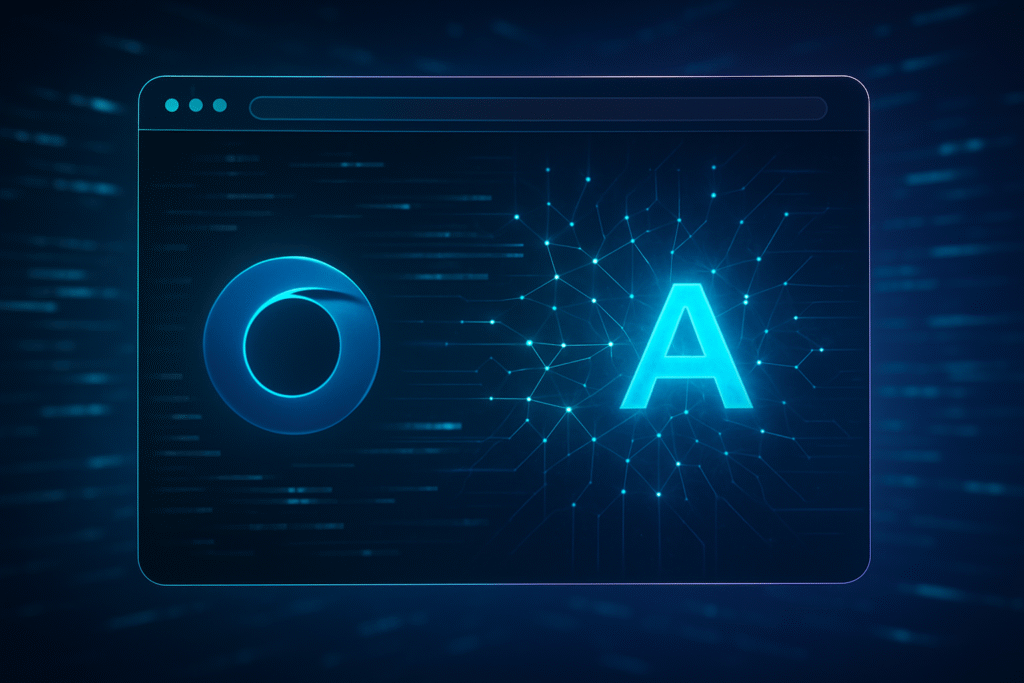
In a bold move that signals a new frontier in the browser wars, OpenAI (NASDAQ: OPEN) officially launched its highly anticipated web browser, ChatGPT Atlas, on October 21, 2025. This innovative browser, deeply integrated with the company's powerful AI, aims to redefine how users interact with the internet, posing a direct challenge to established giants like Google (NASDAQ: GOOGL) Chrome and other traditional browsers. The launch marks a significant escalation in the race to embed advanced AI capabilities into everyday computing, transforming the browsing experience from a passive information retrieval tool into an active, intelligent assistant.
The immediate significance of Atlas lies in its potential to disrupt the long-standing dominance of conventional browsers by offering a fundamentally different approach to web interaction. By leveraging the advanced capabilities of large language models, OpenAI is not just adding AI features to a browser; it's building a browser around AI. This strategic pivot could shift user expectations, making AI-powered assistance and proactive task execution a standard rather than a novelty, thereby setting a new benchmark for web navigation and productivity.
A Deep Dive into Atlas's AI-Powered Architecture
ChatGPT Atlas is built on the familiar Chromium engine, ensuring compatibility with existing web standards and a smooth transition for users accustomed to Chrome-like interfaces. However, the similarities end there. At its core, Atlas is powered by OpenAI's cutting-edge GPT-4o model, allowing for unprecedented levels of AI integration. The browser features a dedicated "Ask ChatGPT" sidebar, providing real-time AI assistance on any webpage, offering summaries, explanations, or even generating content directly within the browsing context.
One of the most revolutionary aspects is its AI-powered search, which moves beyond traditional keyword-based results to deliver ChatGPT-based responses, promising "faster, more useful results." While it offers AI-driven summaries, it's notable that the underlying search verticals for web, images, videos, and news still link to Google for raw results, indicating a strategic partnership or reliance on existing search infrastructure while innovating on the presentation layer. Furthermore, Atlas introduces "Browser Memory," allowing the AI to store and recall user online activities to personalize future interactions and refine search queries. Users maintain granular control over this feature, with options to view, edit, delete, or opt out of their browsing data being used for AI model training, emphasizing privacy by making the memory feature off by default for AI training purposes.
A standout innovation, particularly for ChatGPT Plus and Pro subscribers, is "Agent Mode." This advanced feature empowers the AI to perform complex, multi-step tasks on the user's behalf, such as booking flights, ordering groceries, editing documents, or planning events across various websites. OpenAI has implemented crucial guardrails, preventing the AI from running code, installing extensions, or downloading files, and requiring user confirmation on sensitive websites. Another intuitive feature, "Cursor Chat" or inline editing, allows users to highlight text on any webpage or in an email draft and prompt ChatGPT to suggest edits, summaries, or rewrites, making content modification seamless and highly efficient. Personalized daily suggestions further enhance the proactive assistance offered by the browser.
Competitive Implications and Market Disruption
OpenAI's entry into the browser market with Atlas has profound competitive implications for major tech companies and could significantly disrupt existing products and services. Google, with its dominant Chrome browser and deep integration of search and AI services, stands to face the most direct challenge. While Google has been integrating AI into Chrome and its search offerings, Atlas's "AI-first" design philosophy and deep, pervasive ChatGPT integration present a compelling alternative that could attract users seeking a more proactive and intelligent browsing experience. This move forces Google to accelerate its own AI-centric browser innovations to maintain its market share.
Other browser developers, including Mozilla (NASDAQ: MZLA) with Firefox and Microsoft (NASDAQ: MSFT) with Edge, will also feel the pressure. Edge, which has been incorporating Copilot AI features, might find its AI advantage diminished by Atlas's comprehensive approach. Startups in the AI productivity space, particularly those offering browser extensions or tools for content generation and summarization, may find themselves competing directly with Atlas's built-in functionalities. Companies that can quickly adapt their services to integrate with or complement Atlas's ecosystem could benefit, while those that rely on a traditional browser model might struggle.
The launch also highlights a strategic advantage for OpenAI. By controlling the user's primary gateway to the internet, OpenAI can further entrench its AI models and services, collecting valuable user interaction data (with user consent) to refine its AI. This positions OpenAI not just as an AI model developer but as a comprehensive platform provider, challenging the platform dominance of companies like Google and Apple (NASDAQ: AAPL). The initial macOS-only launch for Apple silicon chips also hints at a potential strategic alignment or at least a focused rollout strategy.
Wider Significance in the AI Landscape
The introduction of ChatGPT Atlas is more than just a new browser; it's a significant milestone in the broader AI landscape, signaling a shift towards ubiquitous, embedded AI. This development fits into the trend of AI moving from specialized applications to becoming an integral part of everyday software and operating systems. It underscores the belief that the next generation of computing will be defined by intelligent agents that proactively assist users rather than merely responding to explicit commands.
The impacts are wide-ranging. For users, it promises a more efficient and personalized online experience, potentially reducing the cognitive load of navigating complex information and tasks. For developers, it opens new avenues for creating AI-powered web applications and services that can leverage Atlas's deep AI integration. However, potential concerns include data privacy and security, despite OpenAI's stated commitment to user control. The power of an AI-driven browser to influence information consumption and decision-making raises ethical questions about bias, transparency, and the potential for over-reliance on AI.
Comparing Atlas to previous AI milestones, it harks back to the introduction of intelligent personal assistants but elevates the concept to the entire web browsing experience. It's a leap from AI being an optional add-on to becoming the fundamental interface. This move could be as transformative for web interaction as the advent of graphical user interfaces was for command-line computing, or the smartphone for mobile internet access.
Exploring Future Developments
In the near term, users can expect OpenAI to rapidly expand Atlas's availability to Windows, iOS, and Android platforms, fulfilling its "coming soon" promise. This cross-platform expansion will be crucial for broader adoption and for truly challenging Chrome's ubiquity. Further enhancements to Agent Mode, including support for a wider array of complex tasks and deeper integrations with third-party services, are also highly probable. OpenAI will likely focus on refining the AI's understanding of user intent and improving the accuracy and relevance of its AI-powered responses and suggestions.
Longer-term developments could see Atlas evolve into a more holistic personal AI operating system, where the browser acts as the primary interface for an AI that manages not just web browsing but also desktop applications, communication, and even smart home devices. Experts predict that the competition will intensify, with Google, Microsoft, and possibly Apple launching their own deeply integrated AI browsers or significantly overhauling their existing offerings. Challenges that need to be addressed include ensuring the AI remains unbiased, transparent, and controllable by the user, as well as developing robust security measures against new forms of AI-powered cyber threats. The evolution of web standards to accommodate AI agents will also be a critical area of development.
A New Chapter in AI-Driven Computing
OpenAI's launch of ChatGPT Atlas marks a pivotal moment in the history of web browsing and artificial intelligence. The key takeaway is clear: the era of AI-first browsing has begun. This development signifies a fundamental shift in how we interact with the internet, moving towards a more intelligent, proactive, and personalized experience. Its significance in AI history cannot be overstated, as it pushes the boundaries of AI integration into core computing functions, setting a new precedent for what users can expect from their digital tools.
The long-term impact of Atlas could reshape the competitive landscape of the tech industry, forcing incumbents to innovate rapidly and opening new opportunities for AI-centric startups. It underscores OpenAI's ambition to move beyond foundational AI models to become a direct consumer platform provider. In the coming weeks and months, all eyes will be on user adoption rates, the performance of Atlas's AI features in real-world scenarios, and the inevitable responses from tech giants like Google and Microsoft. The browser wars are back, and this time, AI is at the helm.
This content is intended for informational purposes only and represents analysis of current AI developments.
TokenRing AI delivers enterprise-grade solutions for multi-agent AI workflow orchestration, AI-powered development tools, and seamless remote collaboration platforms.
For more information, visit https://www.tokenring.ai/.





